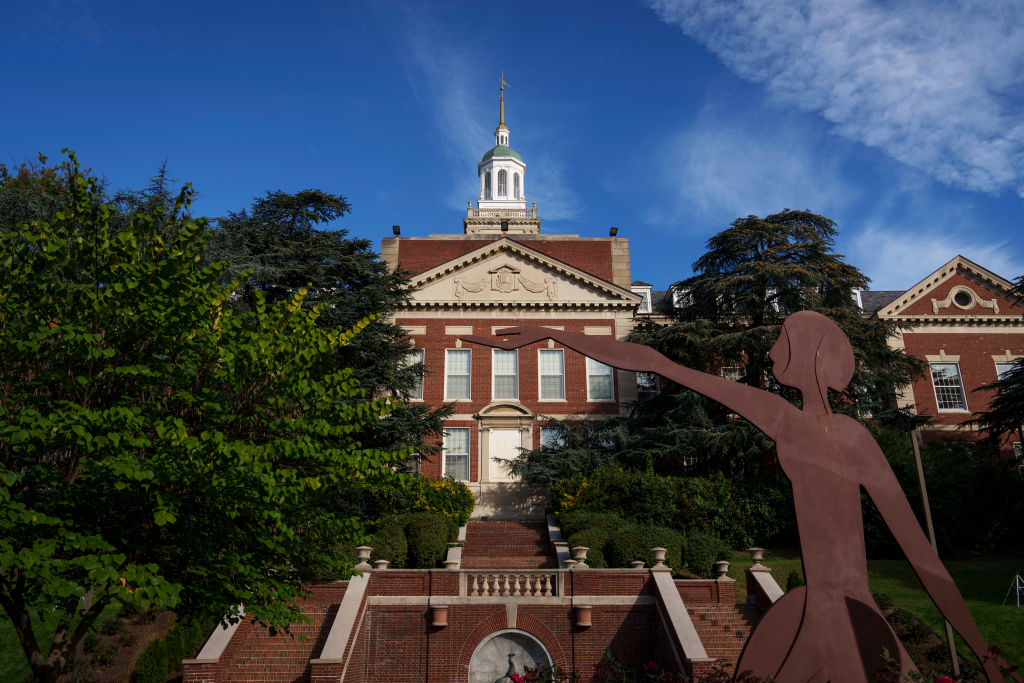HBCU Leaders Suggest Affirmative Action Ending Can Affect HBCU Enrollment
A view of the Howard University campus on October 25, 2021, in Washington, D.C. | Source: Drew Angerer / Getty
The U.S. Supreme Court making it illegal for colleges to consider race as a factor in admissions will most definitely affect the country’s historically Black colleges and universities (HBCUs), a number of leaders at the institutions said. Just not in the way some may think.
While the court’s decision on Thursday to end affirmative action will assuredly decrease enrollment of Black students at predominately white institutions (PWI) like Harvard University and the University of North Carolina — the defendants in the Supreme Court case — it could have the opposite effect for HBCUs.
MORE: OP-ED: The Supreme Court Is A True Maestro Of Regression
While that may sound like good news to some, especially Black college advocates, the Supreme Court decision is still a blow to HBCUs, Howard University President Dr. Wayne A.I. Frederick said shortly after the decision was announced.
“By not allowing race to be considered in admissions elsewhere, you can put even more outsized burden on historically black colleges and universities who don’t have the kind of capacity to carry that type of version, and so I think this is an unfortunate decision,” Frederick said in a televised interview.
With that said, the decision could ultimately help boost HBCU enrollment, which has already been surging in recent years, data show. Some HBCU leaders made it clear that they welcome any applicants who may not have previously considered HBCUs before the Supreme Court ruled that colleges could no longer consider race in admissions.
“We are well-prepared to receive more applicants this year to attend our school. I want our students to know that nothing about the Supreme Court decision changes that reality for Hampton University, its students and its alumni,” Hampton University President Darrell K. Williams told local news outlet WTKR.
Leaders at other HBCUs expressed a similar sentiment.
“We more than want to welcome those students here and it is our hope that maybe they broaden their perspective in terms of where they might be searching,” Dr. Ricardo Phipps, Provost and vice president of academic affairs at St. Augustine’s University, told Spectrum News.
“You would see more fairly well-qualified Black students perhaps not receiving admission to the Ivy League and looking for friendly and welcoming alternatives,” Kentucky State associate professor of political science Wilfred Reilly told Lex 18 News. “I’ll be the first to say that at Kentucky State and in the Commonwealth of Kentucky, we welcome those students.”
Delaware State University President extended the same kind of invitation to potential applicants beyond the Ivy League spectrum.
“More students of color, who might have chosen to apply to a predominantly white institution, will now apply to and attend an HBCU instead. HBCUs — and an ever-broadening array of HBCUs — will draw a greater number of talented students of color,” Allen wrote to students in a note. “We will welcome them as we have always done. And we will need stalwart partners to help us in our work.”
Frederick, the president at Howard, cautioned, however, that just because the Supreme Court decision could result in more HBCU applicants doesn’t necessarily guarantee their admissions.
Using Howard’s medical school as an example, Frederick pointed to the past in an effort to predict the future.
“We had 8,500 people apply to our medical school this year. We only admitted 126 students,” he said. “And with that supplemental application, we do use that to give certain kinds of students an opportunity. But I think that that can now be challenged to whether we should do that. And that would become a barrier to the production of black doctors in America.”
Frederick later said: “We are going to have to make some decisions down the road about what admissions should look like.”
SEE ALSO:
Ending Affirmative Action: Ketanji Brown Jackson’s Dissent vs. Clarence Thomas’ Concurring Opinion
Read Ketanji Brown Jackson’s Full Dissent After SCOTUS Ends Affirmative Action
The post HBCU Leaders Suggest Affirmative Action Ending Can Affect HBCU Enrollment appeared first on NewsOne.

